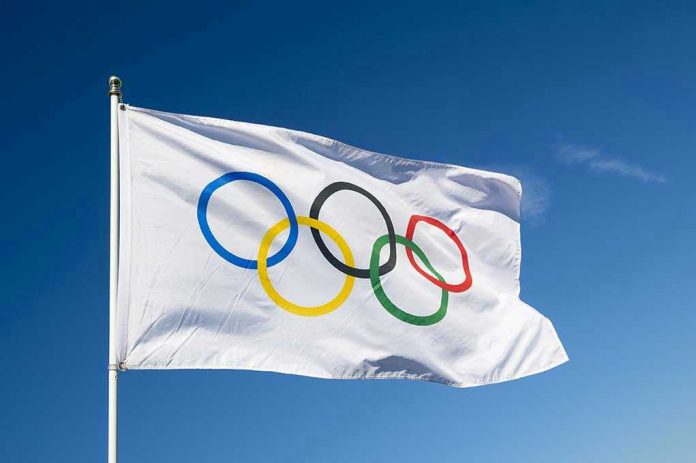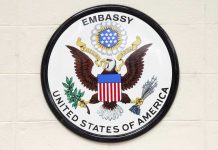
What if the very rules of Olympic competition are about to be rewritten, with a single decision poised to reshape global sports, ignite fierce debate, and challenge ideas about fairness, identity, and the future of women’s athletics?
Story Snapshot
- The IOC is close to banning transgender women from female Olympic events, marking a historic policy shift.
- National sports federations and governments have pressured the IOC, citing competitive fairness and scientific evidence.
- The debate intertwines sports science, politics, and human rights, polarizing advocacy groups worldwide.
- A final decision is expected ahead of the 2028 Olympics, with legal and social ramifications already unfolding.
The Olympic Committee’s Pivotal Moment
International Olympic Committee officials began circulating draft proposals to ban transgender women from competing in female Olympic categories in early 2025. This move follows years of escalating pressure from major federations like World Athletics and FINA, both of which enacted strict eligibility criteria based on scientific findings about the enduring physical advantages gained through male puberty. National governments—especially the US and UK—have weighed in, with the White House issuing a notable executive order supporting exclusion of transgender women from women’s sports.
Sports federations aligned their rules to match the anticipated IOC position, accelerating policy changes across disciplines. Many leaders argue these measures preserve fairness and the integrity of elite women’s competition. Advocacy groups and affected athletes counter that such policies undermine inclusion and violate international non-discrimination norms, setting the stage for heated legal and public battles. The IOC’s evolving stance now reverberates far beyond the Olympic Games, influencing national and grassroots sports policy worldwide.
How the Debate Escalated
The IOC’s journey on transgender participation dates back to 2003, when athletes were allowed to compete after gender reassignment surgery and legal recognition. In 2015, the rules relaxed to permit transgender women in female events if their testosterone levels remained below a set threshold for a year. However, the 2021 framework shifted responsibility to individual federations, emphasizing evidence-based inclusion but leaving policy gaps. High-profile cases, such as Laurel Hubbard’s appearance in women’s weightlifting at Tokyo 2020, ignited public debate and intensified scrutiny. By 2022, scientific reviews prompted federations to implement categorical bans, arguing retained male puberty advantages in strength and endurance sports were insurmountable through hormone suppression alone.
Political actors seized the moment, with US and UK leaders issuing statements and legislation that echoed public concerns about fairness. Advocacy groups split sharply—women’s sports groups championed exclusion for competitive integrity, while LGBTQ+ and human rights organizations decried the bans as discriminatory. The IOC, previously deferential to federation autonomy, now faces a crossroads: uphold a tradition of inclusion or redefine the boundaries of fairness in women’s athletics.
Real-World Impacts: Athletes, Advocacy, and Global Policy
If the IOC enacts its proposed blanket ban, transgender women will be excluded from all female Olympic events, triggering immediate protests and legal challenges. Cisgender female athletes may see increased opportunities, while some argue this restores fairness and safety. Transgender athletes and the broader LGBTQ+ community, however, face a chilling effect, as exclusion at the Olympic level often trickles down to national and youth sports. Sports federations must manage policy alignment and public relations as the world watches.
The economic fallout is unpredictable. Sponsorship deals and funding could shift depending on public and corporate reactions. Socially, the issue has intensified debates about gender and inclusion, and politically, it has become a new front in global polarization, with governments taking clear stances. The IOC’s decision will set precedent, influencing not only future Olympic Games but sports policy across sectors and borders.
Expert Analysis: Science, Law, and Conservative Values
Sports scientists contend that male puberty confers lasting advantages in muscle mass, bone density, and cardiovascular capacity, supporting categorical exclusion for fairness in elite competition. Human rights experts warn such bans risk violating international non-discrimination laws and the Olympic Charter’s principles of inclusion. Peer-reviewed studies show that testosterone suppression does not fully negate performance advantages, fueling calls for either open or third categories to balance inclusion and fairness.
Legal scholars remain divided. Some argue the ban aligns with the Olympic mandate to ensure meaningful competition, while others highlight potential conflicts with established rights frameworks. American conservative values, rooted in common sense and competitive fairness, generally support the exclusion—especially when policy aligns with robust scientific evidence and the protection of women’s sports. The White House’s executive order is a watershed moment, signaling a major policy shift and lending political weight to the IOC’s impending decision.
Sources:
White House Executive Order, February 2025: “Keeping Men Out of Women’s Sports”















